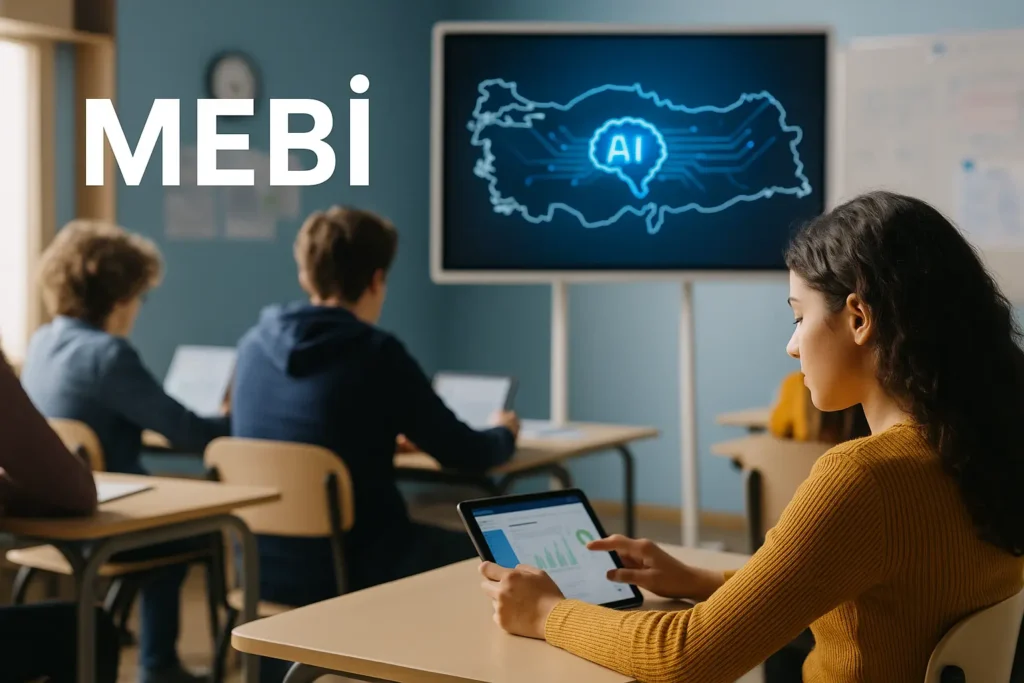Digital transformation is no longer a luxury in education—it is a necessity. Artificial intelligence, data analytics, and personalized learning systems are not merely digitizing education; they are rewriting the very definitions of teaching, learning, and the learner’s role. At the heart of this transformation stands MEBİ (the Ministry of National Education’s Individual Learning Platform), a concrete step in Türkiye’s vision for digitalization in education. Although MEBİ may appear to be just another online platform, it in fact represents a comprehensive educational ecosystem with the potential to make a global impact.
According to the Ministry of National Education (2024), MEBİ is designed to support students’ individual learning processes, create personalized study plans aligned with their goals, and monitor academic growth through AI-driven guidance. This marks a fundamental departure from traditional content repositories: MEBİ is not a mere information database but an AI-powered digital learning universe that places the learner at its center while reinforcing the teacher’s role as a facilitator.
The platform offers a wide range of materials—from video lectures and topic summaries to solved exercises and mock exams—while integrating analytical tools that transform these resources into meaningful learning journeys. Moreover, MEBİ now extends its reach beyond high school to include middle school learners, positioning itself as one of the few large-scale national learning systems worldwide.
Is MEBİ unique in this regard? Not entirely. Around the world, similar digital transformation initiatives exist—such as Singapore’s Student Learning Space (SLS), France’s PIX, and Finland’s Abitti system. Yet MEBİ distinguishes itself through its local authenticity. For example, while SLS provides a cloud-based national learning environment, MEBİ brings together all Turkish students and teachers on a single public platform, emphasizing educational equity as a foundational principle (Ministry of Education Singapore, 2022).
France’s PIX system focuses on assessing and certifying students’ digital competencies. Although MEBİ has not yet implemented a certification component, integrating future tools to measure skills such as AI literacy and digital citizenship could represent a major step forward (République Française, 2023).
Finland’s Abitti system has fully digitized national examinations. MEBİ’s mock test and reporting modules can be viewed as Türkiye’s first step toward a comparable digital assessment infrastructure (Finnish Matriculation Examination Board, 2023).
One of MEBİ’s most notable strengths is its complete alignment with the national curriculum, a feature that carries major pedagogical implications. Enabling students to reinforce school learning in a digital environment helps mitigate learning loss. Furthermore, the AI-driven analysis of students’ weaknesses and the generation of personalized learning paths not only enhance efficiency but also promote educational fairness.
Importantly, the platform is free of charge. Any student with a device and internet access can benefit from its resources. Nevertheless, attention must be paid to the digital divide: when students in rural or underprivileged areas lack adequate connectivity, even the most advanced platform risks losing its inclusiveness. Therefore, MEBİ should be evaluated not only in terms of content but also through lenses of accessibility, teacher support, and cultural responsiveness.
Where, then, can MEBİ be further developed?
First, the integration of teacher-generated content could be strengthened through a digital studio model, similar to Singapore’s approach, where teachers create and share their own instructional materials (Ministry of Education Singapore, 2022). Türkiye is already taking steps in this direction. To reinforce its digital transformation vision, the Ministry has initiated a major partnership with Canva, allowing teachers and students to access creative design tools through EBA (Education Informatics Network). This collaboration aims to cultivate a culture of digital creativity, empowering users not merely as consumers of content but as active creators who shape the learning ecosystem.
Impact assessment should also not be overlooked. The success of MEBİ cannot be gauged solely by the number of users but by its measurable influence on learning outcomes. This requires long-term, data-driven research and sustained academic collaboration.
In conclusion, MEBİ emerges as a robust model that bridges Türkiye’s educational culture with universal standards of digital learning. Its curricular coherence, accessibility, personalization capabilities, and data-driven structure position it not merely as a modern educational tool but as a strategic policy instrument. Through MEBİ, Türkiye is not only responding to the imperatives of the digital age but also translating its own pedagogical identity into the digital sphere.
Can MEBİ evolve into an internationally recognized model? The answer lies in the steps taken today. Principles such as transparency, open-source architecture, teacher participation, equitable access, and academic monitoring will be decisive not only for MEBİ’s present success but also for its future. Nevertheless, the platform’s remarkable progress in such a short time suggests that it may well become a system worthy of global emulation.
References
Finnish Matriculation Examination Board. (2023). Abitti digital examination system. https://www.ylioppilastutkinto.fi/en/abitti
Ministry of National Education. (2024). MEBİ: Bireysel Öğrenme Platformu. https://mebi.eba.gov.tr/
Ministry of Education Singapore. (2022). Student Learning Space (SLS). https://www.learning.moe.edu.sg/
République Française. (2023). PIX: Plateforme d’évaluation des compétences numériques. https://pix.fr/
Discover more from Serkan Akbulut, PhD(c)
Subscribe to get the latest posts sent to your email.

